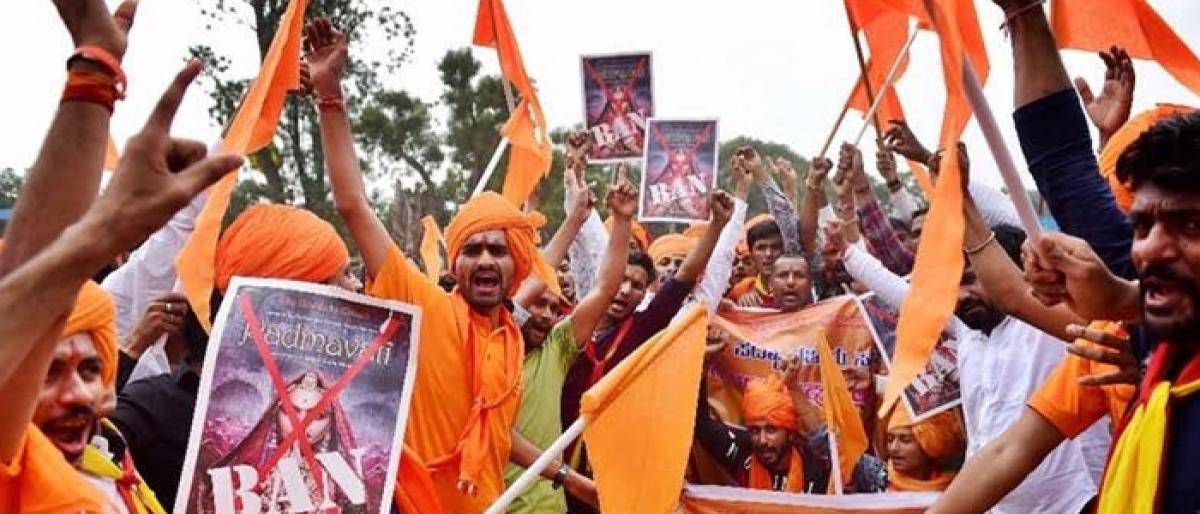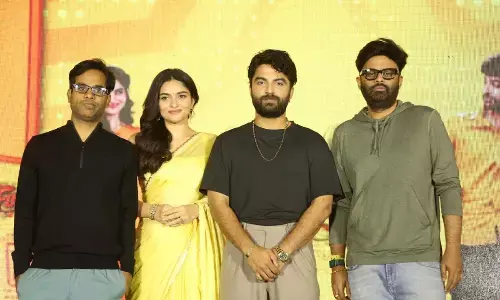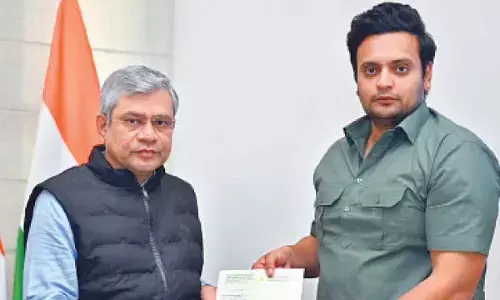History or farce – or a political tool?

This Tuesday, the Supreme Court of India declined the third plea in a row, to ban “Padmavati.” The Court chided the Chief Ministers of Rajasthan, Gujarat and Madhya Pradesh for opposing the screening of the film much even before Censor Board has seen it. Even while that judgment was being pronounced, the Bihar Chief Minister joined the banning bandwagon, for what appears to be less than sound admi
This Tuesday, the Supreme Court of India declined the third plea in a row, to ban “Padmavati.” The Court chided the Chief Ministers of Rajasthan, Gujarat and Madhya Pradesh for opposing the screening of the film much even before Censor Board has seen it. Even while that judgment was being pronounced, the Bihar Chief Minister joined the banning bandwagon, for what appears to be less than sound administrative reasons.
As of now, the Film Censor Board has returned the application of the producer (for certifying the film) on the ground that it was incomplete. The producer has, quite sensibly, withheld release of the movie, though he got clearance from British Censor Board. One was truly worried that the controversy created by this issue would reach a disturbing stage, particularly in view of the impending elections in Gujarat state. For that is the time when emotions run high, and even trivial issues get magnified. And would such a powerful and potent weapon, such as the medium of the cinema, be left unused by the political parties? There is every possibility that, flaunting the theme of disrespect having been shown to the Indian woman, the voting public may be unduly provoked.
Prices ranging from Rs 25 lakh to 10 crore were declared by various community and political leaders for the heads of the producer and the heroine of the movie. The theatre showing premier was vandalised and the artist drawing heroine’s painting was attacked merely on doubt, I repeat doubt, that the characters were not properly depicted in the film, and, in fact, without really knowing what the film was actually going to show.
The situation does, however, raise many questions, the foremost among them being if history should be shown in movies as history is, or not. It, after all, relates to the past, and cannot, therefore, be erased or wished away. Should society make a record of it or forget about it? Would it be prudent to wish away the precious lessons of wisdom and experience that can be learnt from the treasure house of history? To study the past and feed into our current plans the lessons learnt therefrom is our primary duty. How reasonable can it to be to want to change what has already transpired, merely because it appears inconvenient or politically incorrect?
History teaches us, for instance, that King Krishna Deva Raya defeated the Gajapati Kings of Odisha. If this were to be filmed, would the people of Odisha State complain that they were depicted in poor light? Similarly, the Kakatiya Queen Rudrama Devi defeated Maharashtra Kings. Would it cause resentment in Maharashtra? If the fact that Ganapathy Deva was for some time jailed in Maharashtra were filmed, would it be tantamount to insulting the people of Telangana? We have unfortunately reached the stage where no assurance can be held out in response to any of these questions.
And if this is the situation in respect of events duly recorded in history, imagination boggles at the manner in which a clever mind can twist apocryphal stories or events belonging to the realm of folklore – the category to which Padmavati’s story belongs. Here is a story not decisively recorded in history. The current controversy is based on what the Sufi poet, Malik Muhammed Jayasi, wrote in his epic poem about Padmavati. And rumours arising from (the yet to be publicly known) script of the film have resulted in unending street demonstrations. Take the allegation, for instance, that there is a duet between Padmavati and Khilji, a claim hotly refuted by the director, but falling on deaf ears. Every agitator appears to have donned the role of Censor Board and is demanding to see the film beforehand, while the real Censor Board is refusing to see the film on technical grounds!
According to popular belief, Padmavati was a Sinhalese Princess who became a daughter-in-law of the Rajasthanis. It would thus appear proper to advise Sanjay Leela Bhansali to check what the citizens of Sri Lanka would think about the whole story. One has, after all, to guard against probable demonstrations by Sri Lankans residing in Tamil Nadu! And, while one is at it, one might as well look for and find their ancestors of Khilji just to be on the safe side! Perhaps we should ask Bhansali to invite all of us for a preview, to avoid future claims that our relatives were shown as losers in the war! Seriously speaking, the time appears to have come for commissioning a body of experts – those subscribing to different schools of thought – to arrive at a consensus and record the history – at least that which is taught in educational institutions, following acts of such as the state government of Rajasthan recently getting history books revised to state that the Battle of Haldighati resulted in Rana Pratap being the victor and not Akbar – quite contrary to what history has been telling us that Rana lost the battles and exiled himself to the forests.
Also, in recent times, a curious attitude has taken roots – namely that all Muslim kings including Moghuls were outsiders and looters and that, therefore, making a movie about them thus amounts to praising, if not glorifying them. Who are these outsiders anyway? Many races including Sakas, Huns, Yavanas, Kambhojas, Pahlavas, Bahlikas and Rishikas came from outside to the Indian sub-content. They all treated India as their land and settled down here. Calling people like Mohammed Ghazni, Ghori or Timur who invaded and looted our country, is reasonable. But if those who settled down here tilled the land, begot children and left an everlasting mark on the country's history, such as the Turks, Mamluks, the Khiljis, the Tughlaqs, the Lodhis, and the Moghuls, are depicted as exploiters, how can the argument survive? After all, they were also sons of the soil. That much cannot be denied.
The Moghuls did a lot for the country. Since I belong to the agriculture sector by my profession. This writer in a portion records his deep appreciation for the agricultural reforms they brought about. The legion of Urdu words in agriculture and the village administration terminology speaks for itself.
Finally, what I wish to say is that even if Bhansali's movie is full of mistakes it can hardly alter century’s old history. Folklore tells us, for instance, that Anarkali was entombed while still alive. But in the movie "Moghul-e-Azam," it was shown that Akbar finally took pity on her, got her released, and sent her abroad. When confronted, the producer of that movie took the stand that, after all, Anarkali was a fictitious character without any roots in real history – therefore, how did it matter which way an imaginary character was depicted?
Similarly, there are no traces of evidence to substantiate the story of Rani Padmini. But Khilji was a historical character. What people believe is that Khilji, who desired Padmini, invaded Rajasthan. Not wanting to succumb to his advances, Padmini committed self-immolation. I do not think the director meddled with this basic storyline. When all has been said and done, a movie is an instrument of entertainment, and, in seeking to engage the audience, the story writer or director may take a few liberties here and there with the accepted version of what, ultimately, is only an apocryphal narrative,
All in all, it would certainly appear that here is a case of much ado about nothing. The whole sequence of events strongly resembles a farce being played out, and with many tragic consequences. Poor Max, he could hardly have imagined that history could repeat itself as a political tool also.











